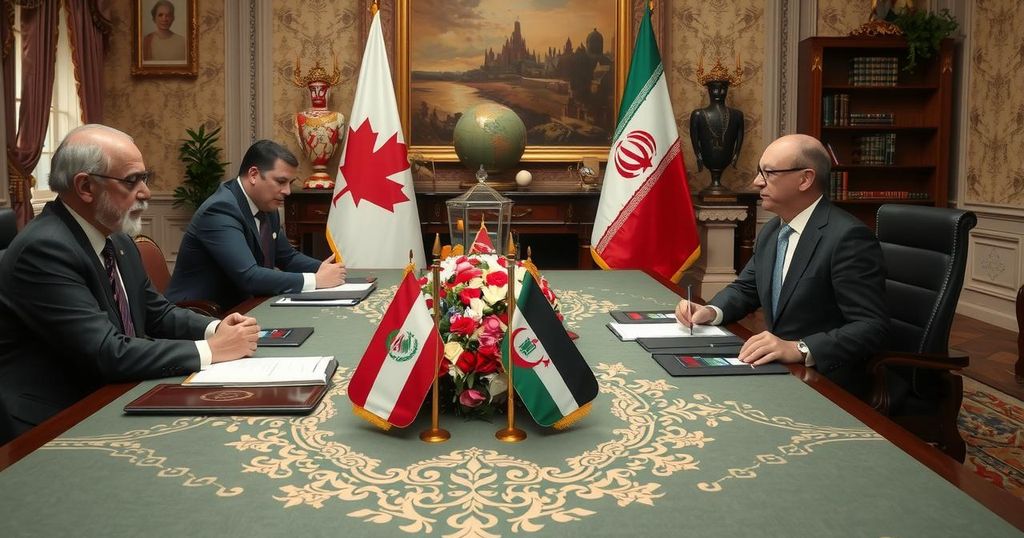Ethiopian and Somali leaders reached a critical agreement in Ankara, mediated by Turkish President Recep Tayyip Erdoğan, to resolve a dispute over Ethiopia’s access to the Arabian Sea. This agreement follows Ethiopia’s controversial port lease in Somaliland and seeks to prevent escalation into conflict, with Turkey emerging as a key player in promoting regional stability and economic collaboration.
In a significant development aimed at easing tensions between Ethiopia and Somalia, Presidents Abiy Ahmed of Ethiopia and Hassan Sheikh Mohamud of Somalia have reached a crucial agreement concerning Ethiopia’s access to the Arabian Sea. This declaration came after extensive negotiations in Ankara, facilitated by Turkish President Recep Tayyip Erdoğan, marking Turkey’s growing influence in the Horn of Africa. This agreement seeks to resolve a year-long conflict stemming from Ethiopia’s lack of a major seaport and implications for regional stability.
The underlying conflict originates from Ethiopia’s status as the most populous landlocked nation globally, a situation exacerbated by Eritrea’s secession in 1993, which deprived Ethiopia of coastal access. Earlier this year, Ethiopia entered into a controversial lease agreement to utilize a port in Somaliland, a self-declared independent region of Somalia. This led Somalia to threaten the expulsion of Ethiopian troops stationed in its territory to combat al-Shabab insurgents, raising concerns about a potential resurgence of historical hostilities reminiscent of the 1977-78 Ogaden War.
Turkey’s involvement in this conflict is underscored by its deep-rooted relationships with both Ethiopia and Somalia, alongside a vested interest in fostering peace. Ankara’s largest overseas military base is located in Somalia, where Turkish forces have extensively trained Somali soldiers. Furthermore, Turkey has provided military support to the Ethiopian government during the Tigray conflict between 2020 and 2022, notably through the provision of tactical Bayraktar drones. This multifaceted engagement positions Turkey as a critical mediator in the region.
As emphasized by Eurasia Group expert Emre Peker, “The agreement will help make Turkey into an even more relevant power in the region, with Ankara pitching itself as a security partner for African countries.” Turkey’s commercial interests are also prominent, having invested over $2 billion in Ethiopia, second only to China in terms of foreign investment. The agreement paves the way for increased trade opportunities by enhancing Ethiopian access to Somali ports, which could favor Turkish enterprises in significant infrastructure endeavors, as noted by Peker.
Next steps include a meeting scheduled for February, where representatives from both nations will engage in “technical talks” aimed at addressing the specifics of port access. This dialogue is viewed as a vital step toward ensuring lasting peace and cooperation in the region.
The conflict between Ethiopia and Somalia primarily revolves around Ethiopia’s long-standing lack of access to the sea, a situation that has hindered its economic growth and development since Eritrea’s independence in 1993. In a recent agreement, Ethiopia has sought to secure port access through a deal with Somaliland, which has generated considerable tension with the Somali government. The international community’s interest in the Horn of Africa is amplified by Turkey’s increasing diplomatic and military presence in the region, highlighting the complexities of these relationships.
In summary, the agreement mediated by Turkey between Ethiopia and Somalia marks a significant step toward mitigating long-standing tensions over access to important maritime routes. Turkey’s growing influence as a mediator and strategic partner in Africa could lead to enhanced stability and economic benefits for all parties involved. The forthcoming negotiations in February will be crucial in detailing the terms of port access, which holds the potential to facilitate trade and strengthen regional ties.
Original Source: www.gzeromedia.com







